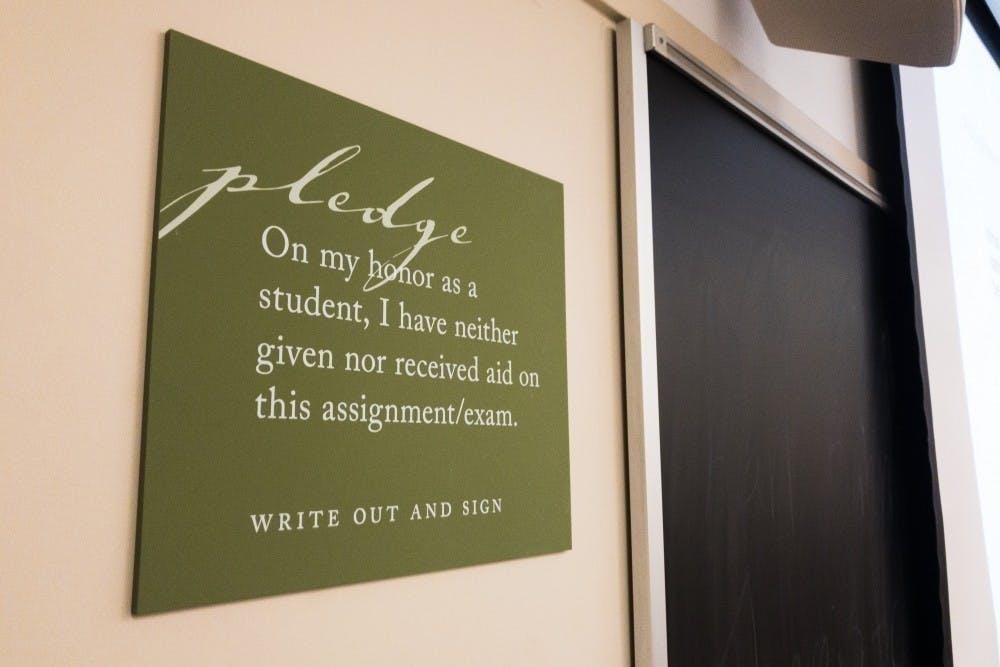The Honor Committee passed two sets of by-laws during its first meeting of the new term after new Committee members were elected this spring. With 18 of 20 members in attendance, quorum — two-thirds of the total 27 members — was met for the first time since the Nov. 3 meeting.
As the new committee members have only been in office for a week — the term began April 4 — the committee first ratified the results of recent executive board elections.
Elections were held during Honor’s annual retreat, when all members of the committee spent the weekend electing new executive committee members. Third-year College student Gabrielle Bray was elected chair, third-year Commerce student John Sun was elected vice-chair for hearings and second-year College student Hamza Aziz was elected vice-chair for investigations.
Rep. Ellie Wilkie, third-year College student, was elected vice-chair for the undergraduate community and Rep. Connor Eads, first-year Batten student, was elected vice-chair for the graduate community.
Following the ratification, the committee discussed three by-laws up for debate. The by-laws enumerate more specifically the powers of committee and do not require ratification in a student body vote, unlike constitutional amendments.
Ultimately two by-law revisions passed, the first of which eliminated the response portion of the trial process in hopes of shortening the entire process to two months or less.
As the by-laws now stipulate, both the accused student and reporter are initially interviewed by an Honor investigator. Following these interviews, both parties are able to participate in an interview prior to the hearing where they listen to the opposing parties’ initial interview and respond — but no time limit is set on this portion of the process.
During the meeting, Maggie Regnery, fourth-year Commerce student and outgoing vice-chair for investigations, introduced a new by-law to the new Committee. The by-law was originally discussed in a meeting Feb. 27 but failed to pass as the Committee did not meet quorum.
Under the new by-law, only accused students will have three days to respond once presented with evidence against them and initial interview materials. Following the collection of any additional information, the student will be provided the opportunity to respond again any time up until seven days before the hearing.
“The nature of the by-law is to shorten and streamline the investigations, and a lot of the time that's the biggest complaint from reporters, is it takes too long,” Regnery said.
All 18 members voted in favor of the by-law, including Rep. Daniel Elliott, first-year Law student, who vocally supported making the trial process more efficient during the meeting.
“Removing a formality to make things faster is within the interest of justice,” Elliott said.
The next by-law up for discussion was complementary to the recent referendum, which reduces the guilty sanction from expulsion to a two-semester leave of absence. Over 80 percent of students who voted in elections elected to change the sanction, leaving the Committee’s constitution out-of-sync with the Committee’s by-laws, which govern Committee procedure. The revisions proposed at the Committee’s April 3 meeting bring the by-laws in line with its constitution and passed unanimously.
The referendum has caused concern among former Committee members, as its passage means the sanction for the Informed Retraction — which allows students to admit guilt within seven days of the accusation and take a two-semester leave of absence — and a guilty sanction would be the same.
These by-law changes will differentiate the sanctions by creating a permanent notation — worded as an “Involuntary Honor Suspension” — on any guilty student’s transcript. The revision also authorized the Committee to place a temporary transcript notation on the transcript of any individual who files an IR, worded as a “Voluntary Honor Leave of Absence.” This notation will be removed from the individual’s transcript once the student returns to the University community.
Elliott said he thinks having clear differentiation between the IR and a guilty verdict is necessary.
“The philosophical importance of having something that distinguishes the IR and the guilty. verdict is an investment in a system where we think people can be honorable,” Elliott said.
Finally, the Committee discussed a by-law that would allow members to participate in meetings via Zoom. However, the Committee would still be required to meet quorum in-person in order to allow additional members over quorum to join the meeting virtually.
Rep. Kelly O’Meara, graduate Architecture student, said members should understand the expectations that come with being a member of the Committee and did not support the proposed change.
“I think that if you run for a position on Honor, you should be able to know the full demands of the job and then be here and in this room,” O’Meara said.
Elliott, on the other hand, supported the by-law as it could prepare the committee for unforeseen circumstances, such as the COVID-19 pandemic.
“We have to also recognize that there are some national events that are outside of our control, which often require flexibility,” Elliot said.
Ultimately, the Committee decided to table this conversation until the next meeting in the interest of time. The next meeting of the Honor Committee will take place Sunday at 7 p.m. in the Trial Room of Newcomb Hall.







